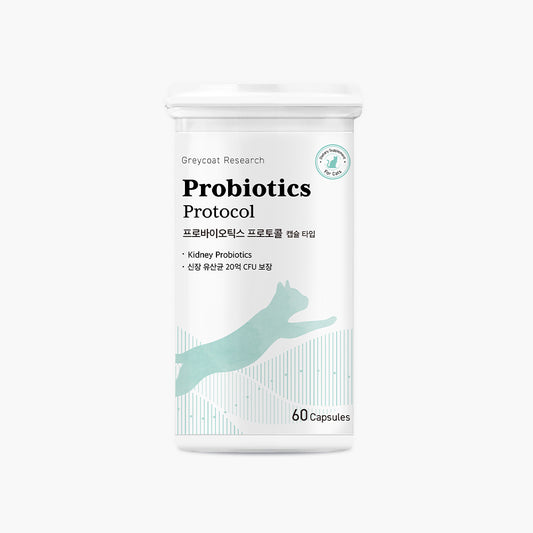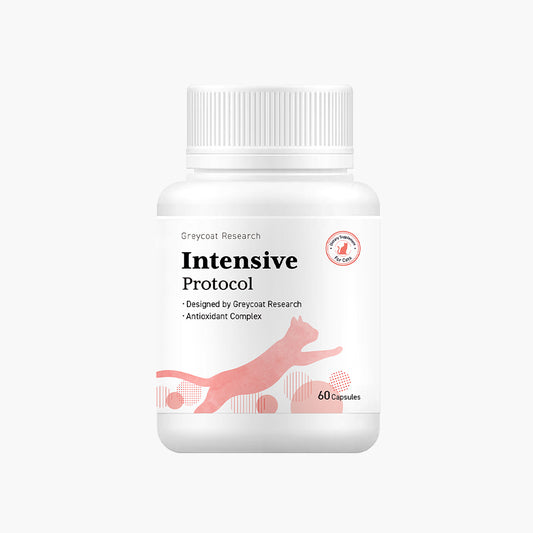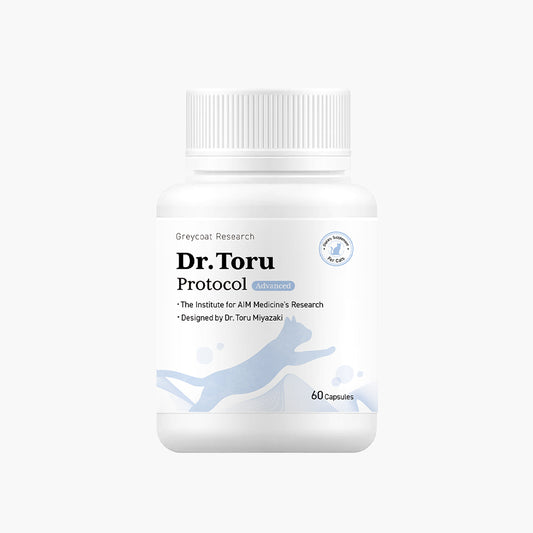
General, a cat with stage 4 CKD.
For cat owners looking after cats with chronic kidney disease (CKD), nothing is more terrifying than the realization that their cat is starting to lose weight.
In CKD cats, weight loss implies that their bodies are breaking down their muscles to use as energy. As muscles are made up of protein, their loss can end up putting a great deal of stress on a cat’s kidneys.
In short, weight loss can accelerate the progression of CKD in cats.
Greycoat Research provides personalized 1:1 consultations for cats with CKD, based on data collected from over 1,000 consultation cases.
- Insights from Dr. Kim Jae-young, who cared for Minky, the oldest living cat in Korea at 28 years old
- Expert guidance from Dr. Kobayashi Motoo, a veterinarian with 30 years of experience in CKD cat care
- Consultations for AIM supplements designed by Dr. Toru Miyazaki of Japan's Institute for AIM Medicine
- Tailored administration guides developed in collaboration with experienced veterinary pharmacists
Can preventing weight loss in cats delay the progression of their CKD? The answer is yes.
However, the issue is that CKD cats naturally lose weight as time passes. This can be attributed to the 3 following reasons:
- Loss of Appetite: Uremia can cause cats to lose their appetite and reduce their food intake.
- Low-protein Renal Diet: CKD cats are put on renal diets to manage their CKD, but renal diets are low in protein, which can expedite weight loss.
- Vomiting and Digestive Issues: CKD cats may frequently vomit, hindering their ability to absorb nutrients and necessitating fasting periods.
In order to overcome these issues, CKD cats need drugs that can boost their appetite, keep their muscles, and prevent vomiting.
1. Mirtazapine (Appetite Booster)

A cat with stage 4 CKD.
A cat without an appetite is an alarm that something may be seriously wrong. Many cat owners, while anxious, may initially pass it off as the cat feeling under the weather, or being picky. They wait a while, assuring themselves that their cats will eat once they feel hungry. But chances are that they’re waiting for a moment that may never arrive.
For cats with CKD, eating can be a matter of life and death. Every missed meal can be critical to their health. That’s why it’s important to boost their appetite and help them become willing to eat.
What Does Mirtazapine Do?
- Boosts appetite to help maintain weight
- Relieves vomiting and nausea
- Combats appetite loss brought about by CKD
How to Administer Mirtazapine
- 1 Day On, 2 Days Off → Prevents the drug from losing effectiveness
- 1 Day On, 1 Day Off → Ideal for cats with lower levels of appetite loss
Caution
- Excessive consumption of Mirtazapine can have side effects such as high blood pressure or spasms.
- Long-term consumption of Mirtazapine can cause it to lose effectiveness, so owners should monitor their cat’s intake.
- Instead of relying solely on appetite boosters, owners should also consider assisted feeding for their cats, and apply both measures simultaneously.
It’s important to make sure your cats eat and get the nutrients they need. That’s why you should prepare Mirtazapine in advance, so you don’t end up missing the opportunity to give your cats the help they need when they need it.
2. Ketosteril (Muscle Loss Prevention)

A cat with stage 4 CKD.
Muscle loss accelerates the progression of CKD. Yet, measures taken to care for CKD cats can ironically induce muscle loss, as renal food meant for CKD cats limits the amount of protein they consume. When CKD cats lose muscle, it is because their bodies are breaking down their muscles to obtain energy. This process, however, produces nitrogenous waste that puts a strain on their kidneys
Preventing weight loss can delay CKD progression. However, CKD cats can’t consume too much protein due to the workload it would place on their kidneys. Therefore, cats need a way to obtain the nutrients to maintain their muscles that does not overburden their kidneys. That’s where Ketosteril comes in.
Ketosteril and Keto-Amino Acids
- Ketosteril contains keto-amino acids as opposed to normal amino acids.
- Keto-amino acids are nitrogen-free, which reduces strain on feline kidneys.
- Keto-amino acids interact with nitrogen metabolites to help build muscles and minimize the production of nitrogenous waste.
What Does Ketosteril Do?
- Maintains muscles and reduces kidney workload
- Prevents loss of weight from low-protein renal food
- Confirmed to maintain weight even in cats with stage 3 or 4 CKD
- Modulates nitrogen metabolism to reduce threat of uremia
- Provides CKD cats on low-protein diets with vital amino acids
How to Administer Ketosteril
- Administer ¼ to ½ of a tablet a day
- Exact dosage must be adjusted based on the cat’s weight and condition
- Owners should consult an experienced veterinarian before administering Ketosteril
Caution
- Ketosteril contains calcium and should not be administered to cats with hypercalcemia.
- 30 mg of BCAA (Branched-Chain Amino Acids) a day can be administered in lieu of Ketosteril.
General’s Case: Stable Weight Despite Stage 4 CKD
General, an 18-year-old cat, was diagnosed with stage 4 CKD, but managed to maintain a stable weight for 3 months with Ketosteril.
Ketosteril helps CKD cats maintain muscle without taxing their kidneys. If you plan on administering Ketosteril to your cat, please consult an experienced veterinarian in advance.
A stable weight can help delay the progression of CKD in cats.
3. Antiemetic – Cerenia

A cat with stage 4 CKD about to vomit.
What makes vomiting so dangerous for CKD cats is the fact that it doesn’t stop. A CKD cat that vomits will vomit again and again, and if left untreated, the constant vomiting will lead to weight loss, causing the CKD to worsen.
What Does Cerenia Do?
- Prevents vomiting and maintains the cat’s condition
- Relieves digestive distress and helps maintain weight
- Necessary for cats for stages 3 CKD and higher
How to Administer Cerenia
- Once a day to be given 1 hour before meals
Caution
- For long-term use, make sure your cat gets periodic liver function tests.
- Only administer when needed, not as a precautionary measure.
Cerenia effectively and immediately suppresses vomiting in cats, allowing them to absorb the nutrients they need.
So if your cat starts vomiting, administer an antiemetic right away.
Get a Free Consultation Today!
If your cat’s been diagnosed with CKD, the most important thing is understanding the proper care strategy right away. However, since every cat’s situation is different, you need customized guidance to ensure effective management.
- Consultations to help choose the right renal diet
- Recommendations for an effective supplement regimen
- Customized solutions for creating the optimal living environment
Greycoat Research provides personalized 1:1 consultations for cats with CKD, based on data collected from over 1,000 consultation cases.
- Insights from Dr. Kim Jae-young, who cared for Minky, the oldest living cat in Korea at 28 years old
- Expert guidance from Dr. Kobayashi Motoo, a veterinarian with 30 years of experience in CKD cat care
- Consultations for AIM supplements designed by Dr. Toru Miyazaki of Japan's Institute for AIM Medicine
- Tailored administration guides developed in collaboration with experienced veterinary pharmacists
Contact Greycoat Research for a free consultation today.



